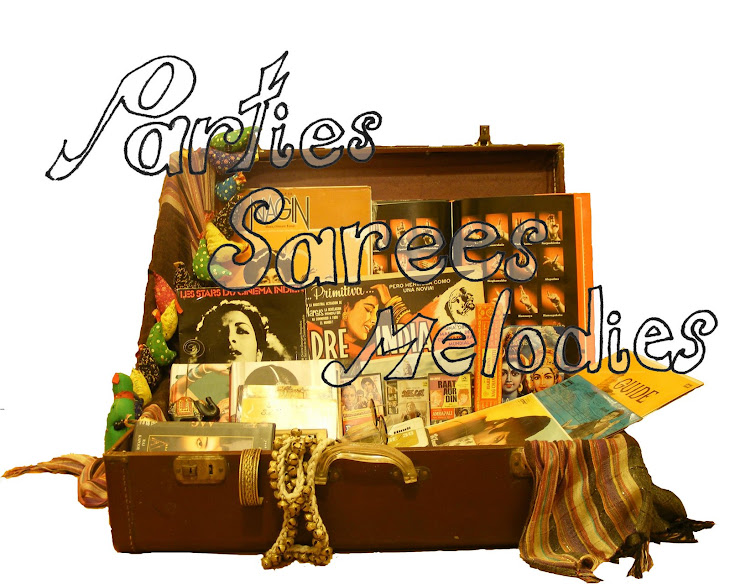
Bombay Talkie is quite a find. The music, by Shankar Jaikishan, is the only collaboration between themselves and the famous Merchant-Ivory film team (Ismail Merchant and James Ivory). The english film, starring Shashi Kapoor, his wife Jennifer Kendal and Zia Mohyeddin, mostly takes place in Bombay of the late 60's early 70's. Vikram (Shashi Kapoor) is an aging hero stuck in an unhappy
.JPG)
arranged marriage with his wife Mala (Aparna Sen). Lucia, a three time married middle age novelist, takes a liking to Vikram while Hari, a Bombay screenwriter, madly in love with her, does as she pleases. This has to be my favorite Merchant-Ivory film ever! But I won't say any more than that, as I will probably review the film one day. For now, let me talk about some of the soundtrack's great songs.
The tracks comprise, mostly of various versions of the Bombay Talkie Theme, "Title and Theme" can be heard in the
Title Credits along with "Tum Mere Pyar Ki Duniyamen" a few seconds before that. In this particular sequence, the "Title and Theme" is played as hand painted portraits (filmi style) of the cast and crew are shown around the streets of Mumbai.

Besides the theme variations, five, of what we can call conventional, songs are found on the record. Along with the previously mentioned "Tum Mere Pyar Ki Dumiyamen" you have to start with the great and famous "
Typewritter Tip Tip Tip" song because, well, just because. With the fantastic Helen and Shashi dancing on a giant typewriter, what else do you need. A young and spunky Usha Lyer gives us two versions of "Hari Om Tat Sat" (हारी ॐ तट सात). One is the orchestrated version which is
the film version and the other version is the "official" version. She also sings the vocals to the Bombay Theme tune "Good Times, Bad Times".
As for the variations I enjoy the "Rajput Suite" "Now I Shall Call You Ma" and especially "Picnic in the Cave" with it's new wave synthesisers.
Overall, though it's not entirely a commercial Hindi film soundtrack, it is very enjoyable and interesting to listen too. As much for it's filmi s

ongs, instrumentals and some rare Usha Lyer (now Usha Uthup) tunes. Just listen for yourselves!
Oh, and once your done listening to the music, those who have not seen the movie yet, rent it or buy it NOW!
Tracks:
Side 11. Instrumental - Title and Theme
2. Mohd. Rafi - Tum Mere Pyar Ki Duniyamen
Variations of theme:3. Instrumental - Incidental Music
4. Instrumental - Devotion
5. Instrumental - Rajput Suite
6. Instrumental - Now I Shall Call You Ma
7. Instrumental - More Incidental Music
8. Usha Uthup - Hari Om Tat Sat
Side 29. Usha Uthup - Hari Om Tat Sat (with Orchestra)
Variations of theme:10. Instrumental - Picnic in the Cave
11. Instrumental - Birthday Party 1
12. Asha Bhosle & Kishore Kumar - Typewriter Tip Tip Tip
Variations of theme:13. Instrumental - Meeting and Birthday Party 2
14. Usha Uthup - Good Times, Bad Times
Lyrics: Hasrat Jaipuri, Usha Lyer/Uthup only for "Hari Om Tat Sat"
Stella_1's score:
4/5Get the music now: Shankar Jaikishan
Bombay Talkie
 Chalti Ka Naam Gaadi is not my favourite soundtrack nor is S. D. Burman my favourite composer. None the less, this hindi comedy does have it's own charm. Kishore Kumar's "Ek Ladki Bheegi Bhagi Si" is the best song on the record, and is today considered a classic.
Chalti Ka Naam Gaadi is not my favourite soundtrack nor is S. D. Burman my favourite composer. None the less, this hindi comedy does have it's own charm. Kishore Kumar's "Ek Ladki Bheegi Bhagi Si" is the best song on the record, and is today considered a classic..JPG) For a comedy, which usually tends to lack in the song department, this record tries its best to cater and reach out to the common city folk with it's modern upbeat music. I like it because its, in a way, unsophisticated and humble which makes it easy to relate to and accessible to everyone.
For a comedy, which usually tends to lack in the song department, this record tries its best to cater and reach out to the common city folk with it's modern upbeat music. I like it because its, in a way, unsophisticated and humble which makes it easy to relate to and accessible to everyone.
 While many westerners know Satyajit Ray as a director, most famously for his Apu Trilogy. The famous Bengali also gained some recent popularity as a composer with Wes Anderson's 2007 film
While many westerners know Satyajit Ray as a director, most famously for his Apu Trilogy. The famous Bengali also gained some recent popularity as a composer with Wes Anderson's 2007 film 





.JPG) arranged marriage with his wife Mala (Aparna Sen). Lucia, a three time married middle age novelist, takes a liking to Vikram while Hari, a Bombay screenwriter, madly in love with her, does as she pleases. This has to be my favorite Merchant-Ivory film ever! But I won't say any more than that, as I will probably review the film one day. For now, let me talk about some of the soundtrack's great songs.
arranged marriage with his wife Mala (Aparna Sen). Lucia, a three time married middle age novelist, takes a liking to Vikram while Hari, a Bombay screenwriter, madly in love with her, does as she pleases. This has to be my favorite Merchant-Ivory film ever! But I won't say any more than that, as I will probably review the film one day. For now, let me talk about some of the soundtrack's great songs.





.JPG)


